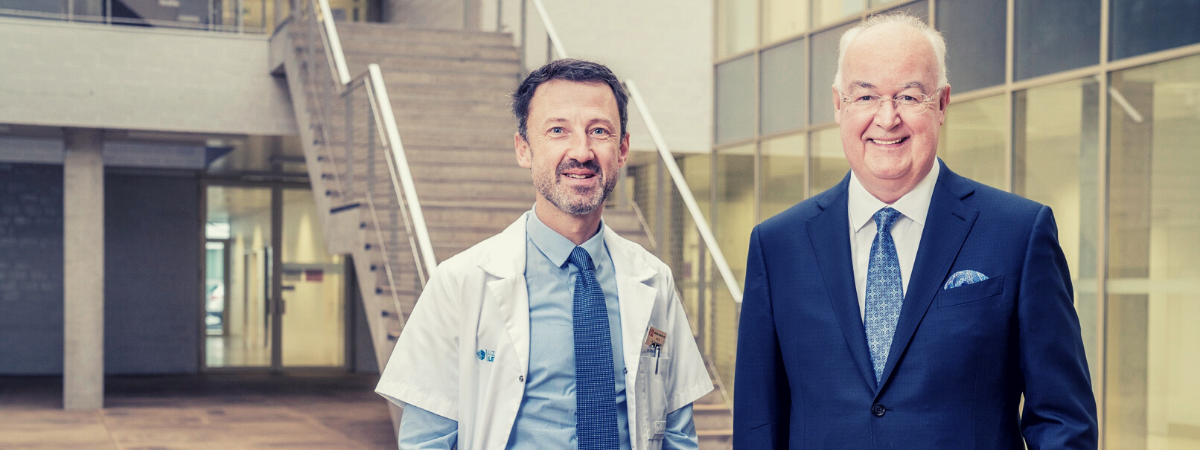Interview with our chairmen
At Mission Lucidity, we aim to make a lasting and worldwide impact on the fight against neurodegenerative diseases by joining forces between basic scientists, clinicians and engineers. Urbain Vandeurzen, entrepreneur, captain of industry and chairman of our Steering Committee, and Professor Mathieu Vandenbulcke, geriatric psychiatrist and chairman of the Scientific Committee, talk about our mission and what drives them to support it.

What is it about Mission Lucidity that made you want to be a part of it?
Urbain Vandeurzen: Neurodegenerative diseases have a profound impact on patients and families, and a much higher 'misery index' than cardiovascular disease and cancer combined. I have seen the human toll from nearby, as my mother died with Alzheimer's. So when I was asked in 2013 to become chair of KU Leuven's first campaign for major philanthropic support towards neurodegeneration research, Opening the Future, it was like a no-brainer. I think it is a wonderful ambition to want to offer patients and their families a better perspective. The link to KU Leuven also brought me back to my roots: I have been fortunate to develop my company LMS, one of the university's first spin-offs, into a global engineering innovation leader that serves the Top 500 Global Manufacturing Companies. Applying my deep business experience and network to turn Opening the Future into a success, has been a fantastic opportunity. Expanding on this top story, we founded Mission Lucidity in 2018 as a multidisciplinary partnership between KU Leuven, UZ Leuven, VIB and nanotechnology hub imec.
Mathieu Vandenbulcke: Mission Lucidity is all about connecting people: building bridges between the worlds of basic scientists, clinicians and engineers, and trying to speak a common language. While my main motivation is to improve the lives of patients, I notice that it greatly expands my own world. As a clinician, it is really inspiring to get a chance to contribute to the discovery of fundamental scientific insights and join the brainstorm about which technological developments could be most impactful. It also feels great to be part of a strong community with a shared mission, in which we try to align our personal aspirations with the whole as much as possible, but make them subordinate to the higher goal. In that aspect, it's already a success.
How is Mission Lucidity a game-changer?
Urbain Vandeurzen: I insisted to bring an entrepreneurial approach to Mission Lucidity, because it is all about science management: developing a vision for the future, formulating an inspiring goal that can make people enthusiastic, and collecting the best possible talents. And of course, ensuring that all necessary resources are available. It is important that we take a result-oriented view on this: we do not aim for small incremental steps forward, but want to fundamentally understand the problem of neurodegeneration and create a lasting impact for patients and caregivers. Another merit of Opening the Future and Mission Lucidity is that they help to place increased financial support for neurodegeneration research on the political agenda, both at the level of the partner institutes as at the Flemish government.
Mathieu Vandenbulcke: Most research projects require results within a few years, but Mission Lucidity makes it possible to truly think in the long term: how can we help the next generation forward? We should all dare to shift to a more unbounded anything-is-possible mindset. That is also reflected in our international ambitions, like our strategic partnerships with the UK Dementia Research Institute and Stanford University for specific projects. Scientific excellence and collaborations should not be restricted by national borders.
We should all dare to shift to a more unbounded anything-is-possible mindset
What is Mission Lucidity's research focus?
Mathieu Vandenbulcke: We strongly believe that technological innovations are the key to creating scientific and clinical breakthroughs. We are organized in multidisciplinary task forces, each tackling a different neurodegeneration aspect, but all interconnected. This ranges from creating a genetic risk profile that is tied to specific disease pathways and aimed towards personalized prevention, to minimally-invasive brain stimulation for neuroprotection and cognitive stimulation. We are also developing a humanized brain-on-chip model to identify molecular mechanisms of Parkinson's disease, and an advanced retinal scan to detect Alzheimer's disease in early stages.
Urbain Vandeurzen: Our current research lines were carefully selected based on the relevance and credibility of the teams and projects. This led to a diverse and complementary research portfolio that was encouraged by the top in a sort of holistic vision, but developed bottom-up by the research teams – that is why I believe in its power.
It's simple: the efforts and resources that are being spent now, will be earned back a thousand times if we continue to invest them in this kind of important research
What does the funding model look like?
Mathieu Vandenbulcke: The basic support will always come from the regular channels, such as competitive calls and internal funding within the partner institutes. But our goal is to obtain at least half of the required budgets through large philanthropic foundations.
Urbain Vandeurzen: The resources obtained through philanthropy can be seen as high-risk, high-reward funding: we actually give confidence to research teams, on the only condition that they will go for excellence and look for breakthroughs. Philanthropy is what allows us to think in the long-term and truly do next-generation research, thanks to creating leverages. It's simple: the efforts and resources that are being spent now, will be earned back a thousand times if we continue to invest them in this kind of important research. The lives of millions of patients and their families may change forever.